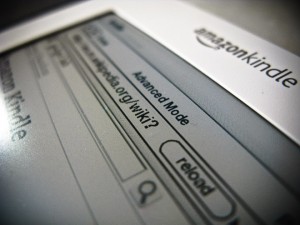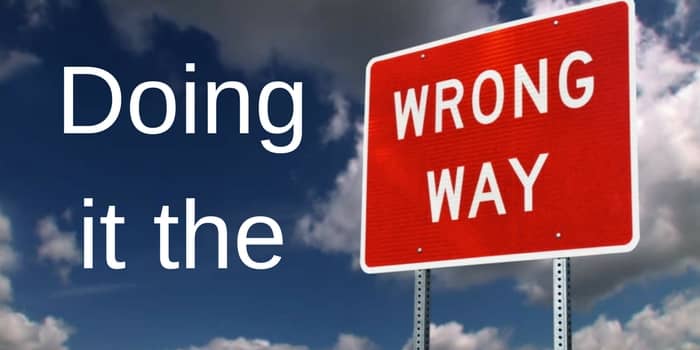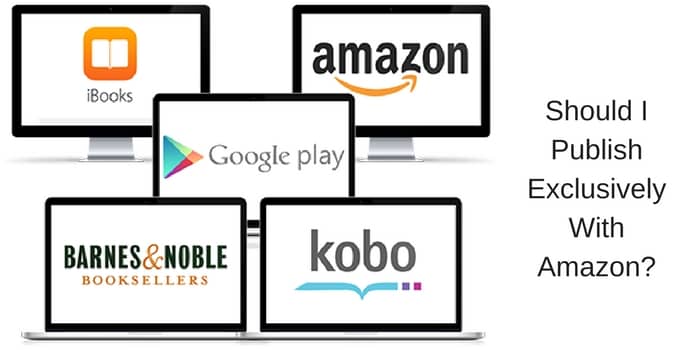 Don’t get too carried away with marketing your ebook all over the world, as the world hasn’t yet become universally Kindled or Nooked. To be realistic about all the Amazon hype, ebooks are still predominately a US phenomenon. Yes, of course, ebooks and e-readers are sold outside the US, but you can really forget about markets such as France, India, Australia, Asia and many other countries and regions where Amazon either doesn’t have a presence or has yet to, or may never offer Kindles and ebooks.
Don’t get too carried away with marketing your ebook all over the world, as the world hasn’t yet become universally Kindled or Nooked. To be realistic about all the Amazon hype, ebooks are still predominately a US phenomenon. Yes, of course, ebooks and e-readers are sold outside the US, but you can really forget about markets such as France, India, Australia, Asia and many other countries and regions where Amazon either doesn’t have a presence or has yet to, or may never offer Kindles and ebooks.
France is a great example. Amazon has its own large store there but has not been offering Kindles or ebooks until just very recently. Australia is a surprise in not having an Amazon store at all. There may be Amazon Japan, but it is not a store servicing the broader Asian region and has yet to offer Kindle even in Japan. As an absurdity, Amazon UK do sell Kindle books, but they are NOT shared listings from the US store, so reviews don’t get posted from one store to the other and paperback versions listed in the US may not appear in the UK store. Go figure that.
It’s very easy to be convinced of worldwide success on the Internet, but one should step back sometimes and take a longer look. US market success, while being very big, of course, is not worldwide success. I often hear from people in Canada who feel aggrieved at not being able to participate in some US market opportunities.
To be perfectly honest, the Amazon ebook explosion has really only exploded for authors in the US. As an author publishing on their platform, I am penalised at every step, simply for not being domiciled in the US. This applies to many authors and writers I know who live outside the US. Some of these problems are caused by US government regulations, but there is still an awful lot Amazon could do for non-US authors.
So the lesson is: don’t throw away your paperback and hardcover marketing just yet. There are still many people out there who read books and have yet to be convinced or have the opportunity to take part in the ebook revolution.
And if you are a reader who lives outside the Amazon market zones and wants to read Kindle books, your only choice is probably to order from Amazon US if it is possible and local import duties aren’t exorbitant.




I’ve read that Smashwords is becoming popular among European readers. No extra charges of the type that Amazon adds, and a choice of formats. If you have the free Kindle desktop app, or an app like Stanza for your device, you can read Amazon’s mobi files. Granted, many of the books Amazon offers aren’t available through Smashwords, but more and more publishers are putting their lists on Smashwords, and authors are also uploading any backlist they have rights to. Smashwords will never outcompete Amazon, but it *is* expanding access for writers and readers.
True Catana, but Smashwords lacks one small feature that kills it as a source of any decent amount of sales. 1 click buying. Very few readers know how to add a .mobi file to their Kindle.
But at the same time, they do supply Sony, Apple and B&N, so they do serve a slice of the market.
Just coincidently, an author I’m very familiar with just posted her latest sales stats on her blog. They’re for this month, broken down into the numbers for the various retailers. She distributes through Smashwords, and has just recently started publishing on Amazon (that may be part of Smashwords initial push with Amazon). It looks as if Amazon will undoubtedly outsell Smashwords, but she has been a Smashwords “bestseller” for some time, with her sales steadily increasing. I know this is somewhat to the side of your post, but judging from what Mark Coker has said, some of those sales are almost certainly from Europe.
As for reader’s ignorance and demand for one-click shopping, I can’t agree. I see too many comments about people reading their mobi books in Calibre, Stanza, or other apps. And since most sites don’t have one-click buying and downloads, yet are doing well, that argument just doesn’t stand. Since this *is* still early days for ebooks, it stands to reason that readers will become increasingly sophisticated and able to make buying choices that don’t depend on Amazon. Will that change Amazon’s predominance? Of course not, but other markets are there, and growing. And increasing numbers of Europeans are getting just a bit touchy about paying surcharges to Amazon.
Nothing would please me more Catana than to have Smashwords selling my books in droves.
But my sales figures tell me in plain numbers that I sell 1,000 ebooks on Amazon, Apple and B&N to one on Smashwords. One Click is king. Mind you, my Apple, Sony and B&N sales are via Smashwords, so this part works very well. But again, these are ‘one click’ sales onto iPads, Sony Readers and Nooks.
While I agree that users will become more savvy in time, there are those in abundance (like my wife) who have no idea how to add a Smashwords ebook to their Kindle.
I was greatly peeved at having to copy and paste all of the reviews for my scifi novel “Onet’s Tale” from Amazon US to Amazon UK.
You should take a look at what Amazon UK advertise as excellent reading each month. Most are re-prints of works from the 19th and 20th centuries, or ghost written nonsense for brain dead so-called celebrities.
:)
How did you manage that, Jack? Unless you created all those reviews yourself using cyber-aliases. (Now why didn’t I think of that) :)
Know how it works, or doesn’t work Jack. I’ve given up on Amazon UK. It’s a franchise and clearly very separate from the US site. Why? No bloody idea. But it’s about as useful to me as an ashtray on a motorcycle.
Another Amazon mystery.
Very true, Derek. Even affluent countries like Sweden, Denmark or Norway ignore ebooks for the most part. One of the largest Swedish bookstores with an online presence in Sweden (which shall go unnamed) sells PDFs — PDFs! — as ebooks — and in all honesty I feel that is a terrible format for eBooks. Furthermore, the ebook versions are a good deal more expensive than the paperbacks.
Same thing with ebooks acquired from Amazon US, which I guess is a problem you have to deal with, living in Switzerland and all. Most US-based authors probably don’t understand that having their ebook listed in Amazon UK only makes their work available to UK customers. The same happens with Amazon France ebooks. I live elsewhere in the EU, and get all my Amazon reading fare from the US store. The UK store won’t actually let me download anything.
This is why so many articles about the future of paper books and the overwhelming success of ebooks seem one-sided and ill-informed to me. Mostly they come from people without a solid understanding of non-US markets.
The upshot: pirated ebooks are widely available on the Internet and, the more difficult it is to acquire ebooks legally, the more everyone in the publishing industry will suffer.
These old-world territorial/copyright restrictions from before the Internet age are hurting everyone. We need a world standard for copyright and we need it now.
All very true Bell. The Kindle ebook revolution is very much a US issue only.
Your point about copyright is acutely valid as well. A quick bittorrent search will bring you just about any ebook you want. So much so, all Harry Potter books are now zero value currency – if you know how to download a torrent file.
And the worst news. I can even bittorrent my OWN books, and I’m bloody nobody!
Why Amazon shoots themselves in the foot is beyond me. Instead of breaking the English market into little segements with surcharges, why not lump the whole thing together. The US is a big English market but if you could link Canada, The UK, Austrailia and India into one huge group without the extra charges, you would unlock some serious potential.
You’re spot on about the Canadian market, by the way.
If I were suddenly posessed with a desire to buy a Rav-4 I could cross the border into Montana and buy it for twenty percent less than if I went to Ontario and bought it straight off the production line. (That same plant ships to all North American dealerships.)
Bookstores had signs last Christmas explaining that the higher prices were simply left over from the old days and would be corrected as soon as new stock arrived. That never happened; if anything the prices now seem even higher.
It is beyond me Andrew. Why Amazon don’t just standardise and internationalise their Kindle Store is a mystery. Smashwords can do it! But then again, once my books go from Smashwords to Apple, they go into nationally protected stores.
Red lines, governments, tax and profit is my logic.
Then again, with Amazon, there is also the issue of ripping off non-US customers with their absurd and rude ‘Free International Wi-Fi Transfer’, which costs from $0.30 to $1.00. Their idea of free gets my ire up every time I mention this.
Did I mention something about ‘Filthy Pigs’ in my last post?
patients my friends ebooks are just now coming of age, within a few years they will be in every corner of the world. glitches will be worked out and electronic bits of code will be sold as books.
patience i meant patience. ha haha
People keep saying that PDFs are terrible for ebooks, and I honestly don’t understand why. I often download books as PDFs if that choice is available. If they’re properly formatted, they’re easy to read and, more important, I can highlight, make notes, and set bookmarks, just as I can with the books I read on my Kindle app.
I’m also outside the US and facing the challenges you mention. Still, Amazon is the big boy in town and publishing with them makes sense.
True Darlene, Amazon are the biggest boy in town. If the town is in the US.
In my town in Switzerland, no one has even heard of a Kindle. Truth. My neighbour is a very well known writer here. He has no idea what a Kindle is. I told him I was selling quite a few ebooks. In paperback or hard cover he asked. No joke.
I recently watched a debate on French TV about Kindle being available in France. (Yeah, at last!). The general consensus was that it was just not literature and would never be accepted in France.
If you’re not in Europe or a Western country/Japan you can’t download the Kindle reading app. Period. Amazon also blocks access to Kindle books based on your IP. I know this because I can’t even access my own books! (For those I self-pub, it’s not an issue, I can slip sideways via the KDP dashboard, but for other presses I’ve written for, I’m all outta luck.)
I had a recent blog post up, comparing Polish print books to Western print books to the ebook revolution. (Sorry, I don’t mean to toot my own horn, but feel it is relevant.) Imo, there are other considerations at play and I don’t think the ebook sweep is going to be as much a slam-dunk as people (in N America) seem to think.
Very true Kaz. Amazon has conveniently divided the reading world into the ‘haves’ and ‘have nots’. And at the same time decided that the same goes for authors. 1st class, 2nd class and don’t bother us please.
One of the most cruel aspects of Kindle, is that even though an author chooses their pricing and royalty level at the time of publishing, this is ONLY for the US. There are many countries where Amazon does not offer a 70% royalty on sales. Australia for example. So if I sell an ebook there, my royalty is cut, but not the price. Yes, Amazon keep the difference and take the cream.
Derek, that last comment was spam. He just copied what I said. And his link is to a commercial site.
Thank you for noticing Catana! They do slip through my spam traps from time to time. Unfortunately.